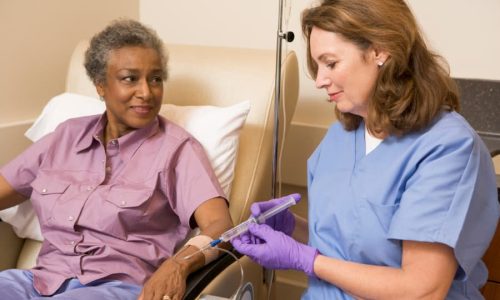
Signs of Precancerous Colon Conditions
Adenomatous polyps are a precancerous condition. They are not cancerous by themselves and are often largely harmless. Their presence, however, indicates abnormal changes to colon
HIPAA Alert: Potential Data Breach Learn More
Questions on Oncology, Hematology and/or Infusion Clinical Services due to COVID-19 Crisis – CALL 833-698-1623
Important Information for Our Patients Regarding the Coronavirus.
RCCA Providing Area Cancer Patients with Access to Care During Coronavirus Outbreak
RCCA Offering Patients Virtual Visits During Coronavirus Pandemic
If you or a loved one has been diagnosed with colon cancer, identifying the treatment approach that’s best for you and your particular circumstances is critical. So is choosing the right cancer care center, one where the provision of compassionate, comprehensive care is matched by access to cutting-edge colon cancer treatments, such as immunotherapy.
At Regional Cancer Care Associates, our experienced medical oncologists help each patient choose the most suitable treatment for their cancer. Whether it is immunotherapy, chemotherapy, or a combination of treatments, patients in New Jersey, Connecticut, Maryland, and the Washington, DC, area can turn to Regional Cancer Care Associates for comprehensive cancer treatment. Here, we discuss immunotherapy for colon cancer.

Colon cancer is a type of colorectal cancer, a category that encompasses both colon and rectal cancers. It is the third most-diagnosed cancer in the United States and one of the leading causes of cancer death. However, it is also one of the most treatable forms of cancer.
Colon cancer begins with a growth, or polyp, in the lining of the colon and can spread to blood vessels, lymph nodes, and other organs of the body. As colon cancer spreads, it becomes more difficult to treat, which is why colon cancer screenings are recommended. Early detection of colon cancer is one key to achieving a positive outcome.
Colon cancer often doesn’t show any symptoms in its early stages, which is why it is important to get regular colon cancer screenings. By the time symptoms do appear, the cancer often has advanced. These symptoms can include:
If you experience these or any other concerning symptoms, make an appointment with your doctor as soon as possible to be evaluated.
Some people have an increased risk of developing colon cancer. This can be due to family and personal medical history, such as having family members with colon cancer, having a history of polyps, or having inflammatory bowel disease. However, there are also other risk factors, some lifestyle-related, that have been linked to an increased risk of developing colon cancer. These are some of them:
It’s important to remember that just because you may have some of these risk factors doesn’t mean you will develop colon cancer. However, experts recommend that most adults start receiving colon cancer screenings at age 45, with some people beginning screening sooner if they have risk factors. People can also help reduce their likelihood of developing colon cancer by exercising regularly, eating a balanced diet, maintaining a healthy weight, quitting smoking, and limiting alcohol consumption.
If your doctor suspects colon cancer or has identified unusual results on initial screening, you will be sent for additional testing. Some of the tests and procedures used for colon cancer diagnosis include the following:
Please note: Regional Cancer Care Associates medical oncologists do not perform colonoscopies or provide other colon cancer screening services. Rather, they treat patients following diagnosis. They also can provide second opinions on test results and treatment plans, if needed.
At Regional Cancer Care Associates, our medical oncologists develop a personalized care plan for each patient to give that person the best chance for cure or long-term control of their cancer. After diagnosis, the stage and type of colon cancer will be assessed to determine the most suitable type of treatment. Treatment options may include the following:
Many times, your oncologist may recommend combining treatments for maximum effectiveness. According to the National Library of Medicine, chemoimmunotherapy is an emerging treatment option for cancer that combines traditional chemotherapy with immunotherapy. The goal is to boost the efficacy of cancer treatment by simultaneously targeting cancer cells with chemotherapy and boosting the immune system’s ability to fight cancer with immunotherapy.
Immunotherapy is an innovative method of treating cancer and other health conditions that uses medicine to enhance the patient’s immune system to help it fight disease. The immune system is made up of different components, and one important element is the T-cells, or the cells that help your immune system fight off diseases.
When a person has cancer, T-cells often can’t identify the cancer cells or attack them on their own. This is where immunotherapy comes in—helping the T-cells find and attack the cancer cells. Other forms of immunotherapy employ different approaches, but in all cases immunotherapy works to bolster the body’s own defences against disease. Immunotherapy can be used alone or in conjunction with traditional cancer treatments, such as chemotherapy or radiation.
If you have recently received a colon cancer diagnosis, you’re probably wondering about your treatment options, including more innovative options like immunotherapy. Immunotherapy for colon cancer is particularly effective in cases where tumors show high microsatellite instability (MSI-H) or DNA mismatch repair deficiency (dMMR).
These terms essentially mean that the tumor contains genetic mutations that fuel its growth. To target these mutations and therefore the excessive growth of cancer cells, immunotherapy drugs are used. To determine what type of colon cancer you have and the genetic makeup of the tumor, your doctors will perform a biopsy and a series of tests. This will help them decide on the best treatment for your colon cancer, whether it is immunotherapy or another method.
Immunotherapy is an effective treatment for many types of cancer, including both solid tumors such as colon cancer and cancers of the blood and blood-forming tissues, such as leukemia and lymphoma. Immunotherapy medications are often given intravenously, as with infusion therapy, but some are taken orally or applied topically. There are a few different types of immunotherapies, including the following:
Monoclonal antibodies are man-made proteins cloned from human or animal cells that mimic the actions of antibodies found in the body. Antibodies identify and attack intruders such as cancer cells, so these man-made proteins do, too, binding to bad cells and encouraging the immune system to attack them. Monoclonal antibodies can also help to interrupt or prevent cancer cell growth.
When T-cells in your immune system can’t identify the cancer cells, those cancerous cells won’t be attacked and will continue to spread. Immune checkpoint inhibitors block the signals that prevent the immune system from identifying cancer cells, enabling the immune system to recognize and attack them. Most checkpoint inhibitors are given intravenously, with each treatment lasting between a half hour and an hour. The frequency of your treatments will depend on the specifics of your case.
T-cell therapy, also known as chimeric antigen receptor (CAR) T-cell therapy, is a type of immunotherapy that modifies the T-cells in a patient’s immune system so they are better equipped to attack the cancer cells. This is done by collecting a patient’s immune cells, growing many more of them in a lab, and then infusing the cells back to the patient via an intravenous line. The cells then can attack the cancer cells. Right now, T-cell therapy is approved by the Food and Drug Administration for only a few types of cancer in specific patient groups, but as research continues, this approach likely will be used in more and more cancers and a broader population of patients. Only to treat unmanageable or relapsed acute lymphoblastic leukemia for patients up to age 25, as well as certain types of aggressive and unmanageable non-Hodgkin lymphoma.
Cancer vaccines are another kind of immunotherapy, triggering the immune system to attack and kill cancer cells already existing in the body. There are both cancer prevention vaccines and cancer treatment vaccines.
Not every type of cancer can be treated with immunotherapy, and not every kind of immunotherapy is ideal for each type of cancer – or patient. That’s why it’s important to discuss your options with your oncologist. At Regional Cancer Care Associates, we work with you to determine whether immunotherapy will be an effective treatment for your colon cancer, as well as whether it should be the first line of defense after diagnosis or used later in the course of your care.
The Food and Drug Administration has approved several immunotherapy options for colorectal cancer, mainly for subtypes that have genetic mutations. Tumors with high microsatellite instability (MSI-H) or DNA mismatch repair deficiency (dMMR) often are ideal for immunotherapy because they can be targeted with specific drugs. Approved treatments include:
Monoclonal antibodies are mainly used for patients with advanced colorectal cancer or colon cancer that is EGFR-positive, meaning that the patient’s tumor has a mutation in the gene that controls development of epidermal growth factor receptor (EGFR), a protein that helps cells grow. These therapies help prevent tumor growth by identifying and marking the cancer cells, so the immune system will attack them.
Checkpoint inhibitors are often used for advanced colon cancer with MSI-H, dMMR, or high tumor mutational burden (TMB-H). They block the signals that prevent the immune system from identifying the cancer cells, helping the immune system target and attack cancer.
Other promising immunotherapies for the treatment of colon cancer are undergoing clinical testing. At Regional Cancer Care Associates, we offer a wide range of clinical trials that may help advance research while providing benefit to patients.
We also have infusion centers where we administer intravenous immunotherapies and other infused therapies to our patients. Our skilled team of oncologists, nurses, pharmacists, and other healthcare professionals have created comprehensive procedures specific to each drug, allowing them to optimize outcomes and reduce the likelihood of adverse side effects.
Immunotherapy treatments often have fewer and less-severe side effects than traditional cancer treatments, such as chemotherapy. However, each immunotherapy has its own safety and side-effect profile, and factors such as a patient’s overall health, age, and other drugs he or she may be taking can affect the incidence and severity of side effects. The side effects that immunotherapy can cause including the following:
Immunotherapy can also cause autoimmune reactions because it is driving changes in the immune system. The body can mistakenly attack itself, sometimes causing serious or even life-threatening problems. Your medical team will monitor you for adverse reactions, but always let them know if you experience any concerning signs or symptoms.
Immunotherapy offers patients with cancer and other health conditions many potential benefits. Although there is no guarantee that immunotherapy will successfully treat every patient’s cancer, there are many advantages to this cancer treatment, including:
These are just some of the reasons why immunotherapy is increasingly prescribed as a treatment for many cancers, including colon cancer. If you have been diagnosed with colon cancer, ask your oncologist whether immunotherapy is right for your case.
Formed in 2012 with the merger of ten separate oncology practices, Regional Cancer Care Associates has been providing comprehensive and compassionate medical care since it was founded. The oncology network has grown extensively since its founding, and now serves patients at 20 convenient locations throughout New Jersey, Connecticut, Maryland, and the Washington, DC, area. The cancer and blood disorder specialists at Regional Cancer Care Associates provide world-class care that is personalized to each patient. These are some of the reasons why our patients choose us:
Receiving a diagnosis of colon cancer can be overwhelming and frightening, but working with a dedicated medical team can enable you to receive both the best treatment for you and the support you need.
If you’re interested in innovative treatment methods like immunotherapy for colon cancer, our team of experienced oncologists can work with you to determine whether it is a good fit for your case. Contact us today to learn more or to schedule an appointment.
For more information or to schedule an appointment,
call 844-346-7222. You can also schedule an appointment by calling the RCCA location nearest you.

Adenomatous polyps are a precancerous condition. They are not cancerous by themselves and are often largely harmless. Their presence, however, indicates abnormal changes to colon

Colon cancer is among the most common cancer types diagnosed in the United States. According to colon cancer projections from the American Cancer Society, about

Some symptoms of colon cancer may not be easy to diagnose. Read about the more uncommon symptoms on Regional Cancer Care Associates’ online blog.

Regional Cancer Care Associates is one of fewer than 200 medical practices in the country selected to participate in the Oncology Care Model (OCM); a recent Medicare initiative aimed at improving care coordination and access to and quality of care for Medicare beneficiaries undergoing chemotherapy treatment.